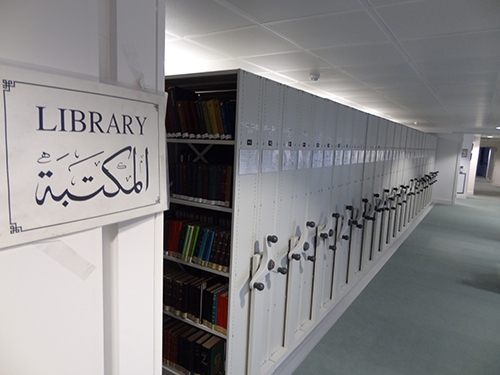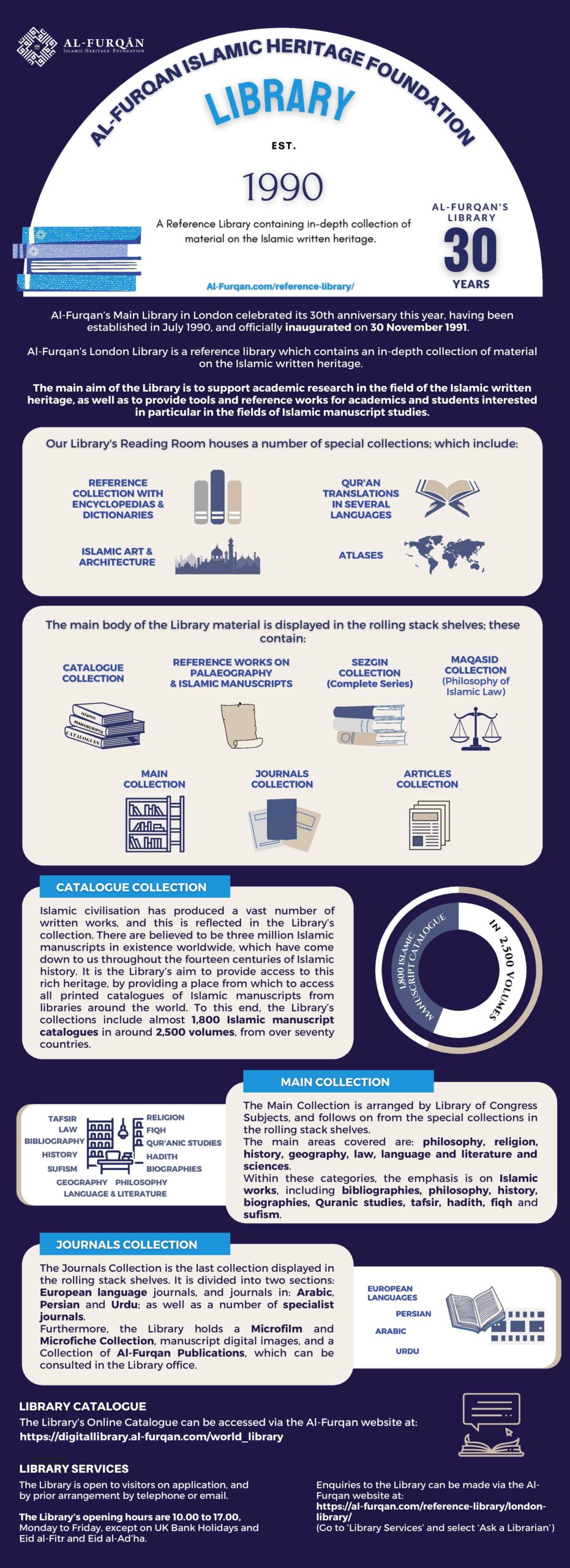Al-Furqan’s London Library is a reference library that boasts a vast collection of materials on the Islamic written heritage. The main aim of the Library is to support academic research in the field of Islamic studies as well as to provide tools and reference works for library patrons interested in particular in the fields of Islamic manuscript studies and related subjects.
E-Database
Our e-database is an open access platform with a search tool that encompasses a wealth of scholarship on the Islamic written heritage. It offers a continuously growing repository of bibliographic information about manuscripts and manuscript collections worldwide, inviting users to delve into a wide range of sources, including published and unpublished catalogues of Islamic manuscript from over 106 countries, an unprecedented, comprehensive bibliography within the field of the objectives of Islamic law (Maqāsid al-Sharīah), and access to our reference library with specialised collections in a range of languages.
Introduction
One of the most important scholarly achievements of the Foundation is the establishment of a major Islamic studies reference library of printed material, in order to support and enhance its various research projects in general, and the cataloguing, study and editing of important Islamic texts on manuscripts in particular.
Al-Furqan’s Main Library in London was established in July 1990, and officially inaugurated on 30 November 1991. The library’s main objective is to uphold the Foundation’s mission by enhancing access to resources on Islamic. Among these, priority is given to a comprehensive collection of printed catalogues of Islamic manuscripts from countries the world over, and to important primary and secondary sources in the field of Islamic studies. The library is intended to serve students and researchers on Islamic heritage, specifically those undertaking research on Islamic manuscripts.

The major subjects covered are: Qur’anic studies, Hadith, Islamic jurisprudence, Islamic theology, philosophy, science, medicine, history, geography, art and architecture, and literature. The Library holds materials in all the major Islamic languages, including Arabic, Persian, Turkish, Urdu, Swahili and Gujarati, as well as many European languages, including Russian and German.
The Library collection also includes multilingual dictionaries, Arabic biographical dictionaries and encyclopaedias from the 7th century to the 21st.
To date, the Library has collected over 11,000 titles in more than 16,000 volumes, on various subjects. Moreover, the Library's collections include almost 1,800 printed Islamic manuscript catalogues in around 2,500 volumes, from over 70 countries.
The Library’s holdings are arranged and organised according to the Library of Congress Classification (LCC) system for ease of use, while its collection of catalogues of Islamic manuscripts is classified by country.
History and Scope
Al-Furqan’s Library started from humble beginnings, with the establishment of Al-Furqan initially in Wimbledon - London.
Our holdings quickly grew under the expert leadership of Dr Aliya Haji; and by the time of its inauguration – in November 1991 – there was a sizeable library, displayed on open shelves on two floors, with a collection of catalogues of manuscripts, reference works on codicology, palaeography, as well as special dictionaries and encyclopaedias, a journals collection, and a main collection featuring primary and secondary sources on the major Islamic classical works.
In the early days, a card catalogue was used to record all new acquisitions, but this was replaced by a custom-made database.
Since then, our holdings have steadily grown and are now displayed in rolling stack shelves, as well as in the Reading Room and Library office at the Kensington premises, which has been Al-Furqan’s Headquarters since 2009.
Library Collections
Catalogue Collection
It is the library’s aim to provide access to this rich heritage, by providing a place from which to access all printed catalogues of Islamic manuscripts from libraries around the world. Our collections include almost 1,800 Islamic manuscript catalogues, in around 2,500 volumes, from over seventy countries.
Special Collections
Our special collections held in the Reading Room include:
- a Reference Collection, with encyclopaedias, dictionaries and other reference works, arranged by subject, such as: religion, history, literature, languages and sciences;
- a Collection of Qurʾan copies and translations in various languages, as well as facsimiles of Qurʾan manuscripts;
- a Collection on Islamic Art and Architecture; and
- Atlases.
Our main collections are displayed in rolling stack shelves that contain:
- the Catalogue Collection;
- Reference Works on Codicology and Palaeography of Islamic manuscripts;
- an Article Collection, with articles related to manuscript studies and collections of Islamic manuscripts;
- the Sezgin Collection, containing the complete collection of the series published by the Institute for the History of Arabic-Islamic Science at the Johann Wolfgang Goethe University (Institut für Geschichte der Arabisch - Islamischen Wissenschaften - an der Johann Wolfgang Goethe - Universität), edited by Fuat Sezgin; and
- the Maqasid Collection with works in the field of the philosophy of Islamic law.
Main Collection
The Main Collection is arranged by Library of Congress Subjects, and follows on from the special collections in the rolling stack shelves.
The main areas covered are: philosophy, religion, history, geography, law, language and literature, and sciences.
Within these categories, the emphasis is on Islamic works, including bibliographies, philosophy, history, biographies, Quranic studies, tafsir, hadith, fiqh and sufism.
Journals Collection
The Journals Collection is the last collection displayed in the rolling stack shelves. It is divided into two sections: European language journals, and journals in: Arabic, Persian and Urdu; as well as a number of specialist journals.
Furthermore, the Library holds a Microfilm and Microfiche Collection, manuscript digital images, and a Collection of Al-Furqan Publications, which can be consulted in the Library office.
Library Catalogue
The Library’s E-Database can be accessed via the Al-Furqan website at: https://digitallibrary.al-furqan.com/world_library
The library holds the following collections:
I Reading Room:
- Reference works (Encyclopaedias and Dictionaries)
- Qurʾan copies and translations
- Islamic Art & Architecture
- Atlases
II Rolling stack shelves:
- Catalogues of Islamic manuscripts
- Reference works on codicology and palaeography of Islamic manuscripts
- Article collection
- Sezgin collection
- Maqasid collection
- Main collection (arranged by Library of Congress - LC - subjects)
- Journal collection
- Uncatalogued books (arranged by subject)
III Library Office:
- Microfilm collection
- Manuscript digital images
- Al-Furqān publications
The reading room and rolling stack shelving collections are free access collections.
The collections housed in the Library Office can be consulted under the supervision of the Library Staff.
The manuscript digital images can be accessed only on the computer situated in the Library Office.
Microfilms and microfiches can be accessed through the microfilm machine, available in the Library Office.
The Reading Room is a large, open, light-filled space with two large desks and chairs available for patrons.
Reading Room Policies
General rules
- Visitors should sign in the visitors’ book at the entrance hall upon arrival.
- First time visitors will be received by the Library staff, and introduced to the Library facilities with a short guide.
- Visitors are required to leave coats, bags and laptop cases in the cloakroom, at the entrance. Transparent bags will be provided for visitors to take their personal belongings to the Library Reading Room.
- Visitors are required to complete the 'Library Visitor Form’.
- Please note that smoking is not allowed anywhere on our premises.
- Please do not interfere with, and / or touch equipment that you are not authorised to handle.
Library rules
- Books cannot be borrowed from the Library, and can be consulted in the Reading Room only.
- Visitors are required to handle the books and journals carefully. No marking, writing or highlighting in books, nor tearing or marking the pages in any way is permitted.
- Visitors can make a limited number of photocopies free of charge, following copyright rules (10% of the work).
- Visitors are required to leave the consulted items on the table in the Reading Room, for Library Staff to re-shelve.
- Visitors may request a copy of manuscript digital images (10% of the work), at the discretion of library staff, and by completing the “Al-Furqan Manuscript Images request form”.
Rolling stack shelves’ use instructions
- Check the spaces between the stacks, before trying to move the units.
- If someone is using the rolling stack, please ensure that their aisle is locked down.
- Use the winding device at the end of the row to move the shelves, in order to get access to the shelves you require.
- Make enough space for you to move comfortably between the shelves.
- Lock the stacks on either side of your aisle in position. There is a brake device in the middle of the winding handle. Push this in. This will click into place and prevent the stacks from moving while you are in the aisle. Sometimes you may have to pull the button towards you, and then push it into place. As long as you feel/hear the "click", the shelves won't move, and you are safe.
- Take a kick stool in with you if you feel concerned about the shelves moving. If you find yourself in a stack whilst someone else is moving it, call out and put your foot on the bottom shelf of the shelving units; a firm push will stop the stacks moving. The kick stool will prevent the shelves from closing on you.
- When you have found the material you need, and have left the aisle of the rolling stack, please release both brakes (by pulling the button towards you), to allow others to move the shelves around.
- If you have any concerns about using the rolling stacks, please ask a library staff member to help you.
Using IT resources
- Visitors can consult the Online Library Catalogue (at https://digitallibrary.al-furqan.com/) on the computer available in the Library Office
- The library Staff are available to provide training and instructions on using the library catalogue (at https://digitallibrary.al-furqan.com/), on the computer available in the Library Office.
- The Wi-fi network is “AF-Events”, and the password is ‘AF7777777’.
- Users are kindly asked not to view, send or download anything offensive within the Foundation’s premises.
Other facilities
- Visitors can use the bathroom facilities located at the back of the reading room.
- Visitors can pray and a prayer mat can be made available.
- Drinking water is available in the office kitchen.
Library Visit Form
Opening hours:
The library is open to visitors on application, and by prior arrangement by telephone or email. Our opening hours are 10.00 to 17.00, Monday to Friday, except on UK Bank Holidays, and Eid al-Fitr and Eid al-Ad’ha.
The Library is closed on weekends, UK Bank Holidays, between the 24th of December and the 1st of January inclusive, and on the days of Eid al-Fitr and Eid al-Ad’ha
Admission to the Library:
Visitors should notify the Foundation in advance of their visit, by either:
- Filling out the Library Visitor Form (first time visitors)
- Email: info@al-furqan.com
- Phone: +44 (0) 20 3130 1530
Directions to Al-Furqan Islamic Heritage Foundation, London
1. Turn right out of High Street Kensington station.
2. Proceed down High Street Kensington until you get to PC World/Currys.
3. Cross the road & proceed into Old Court Place opposite.
4. We are on the left-hand side, No. 22A (black door).
5. The Foundation is on the first floor.
Upon arrival at the Foundation:
If you are driving, please note that the Foundation has no designated parking area.
Please do not park in front of the building; a parking fine may be incurred, and you will be asked to move
Enquiries to the Library can be made via the Al-Furqan website at under the 'Ask a Librarian' tab above.
Ask The Librarian


